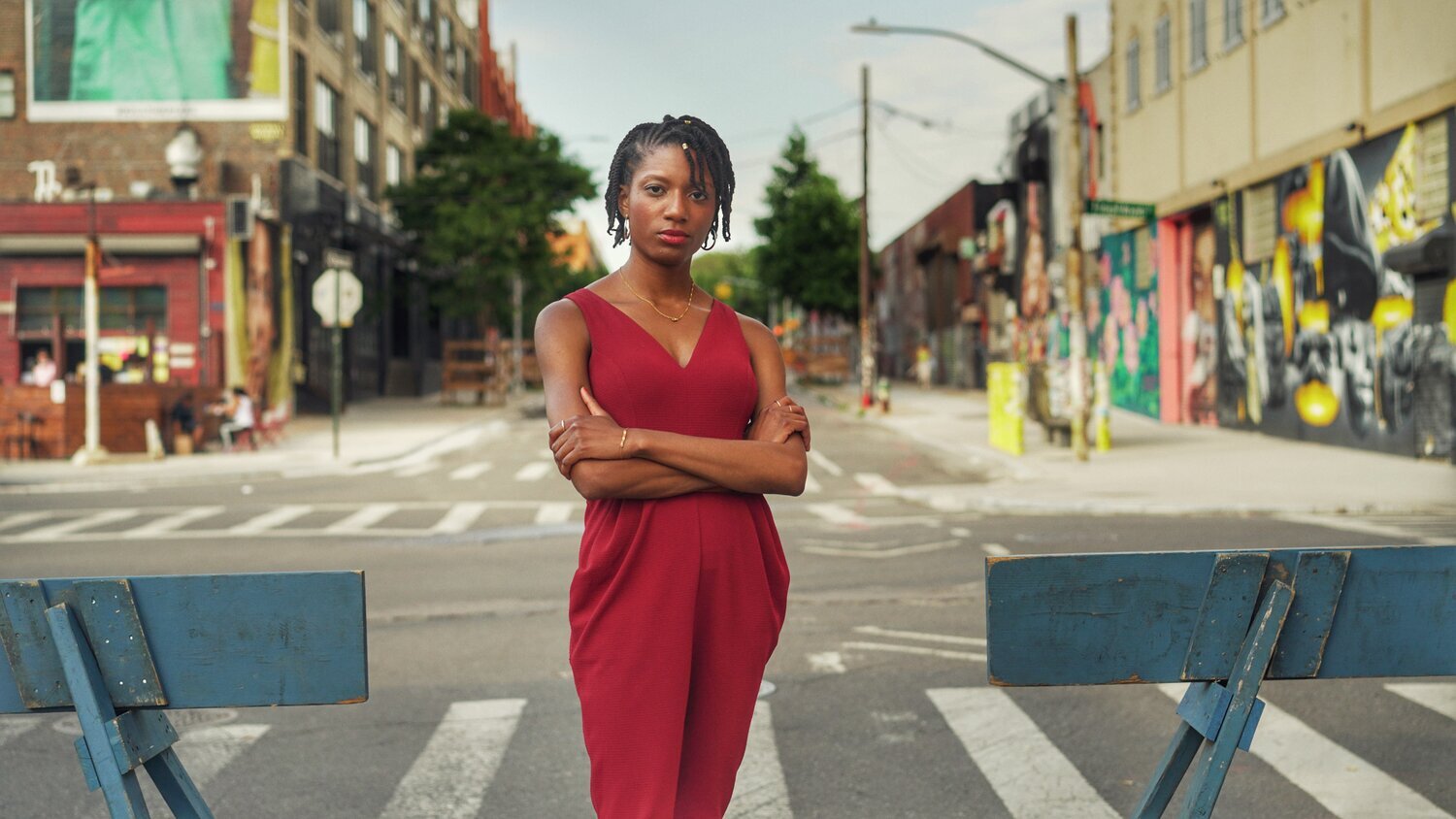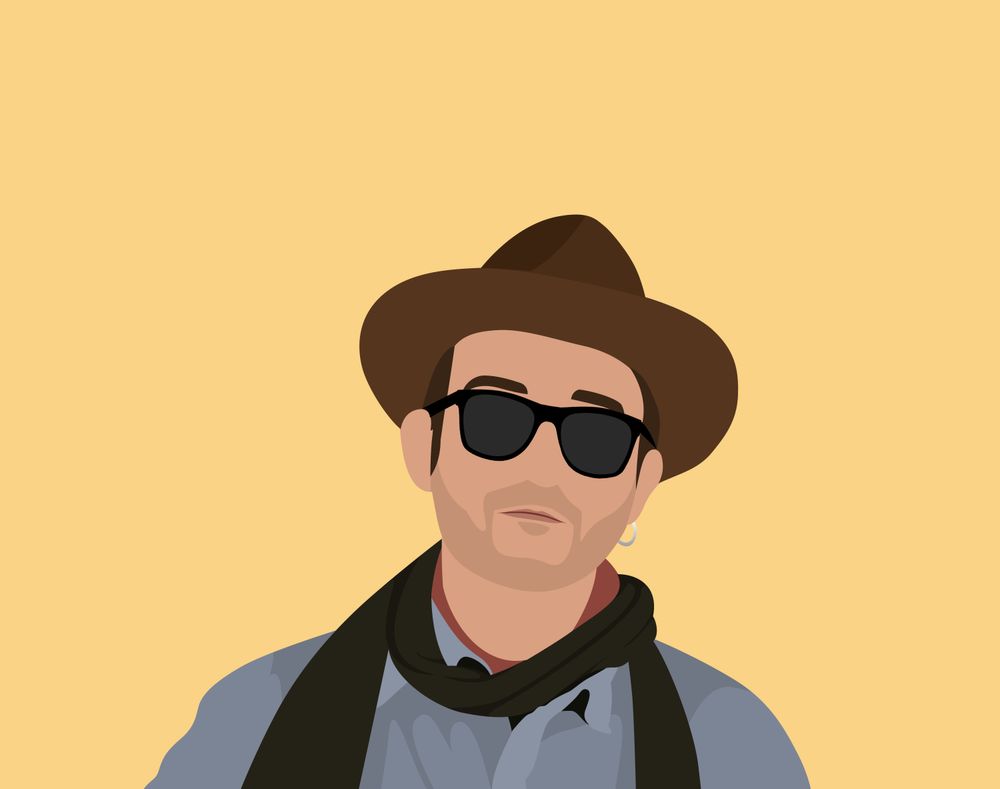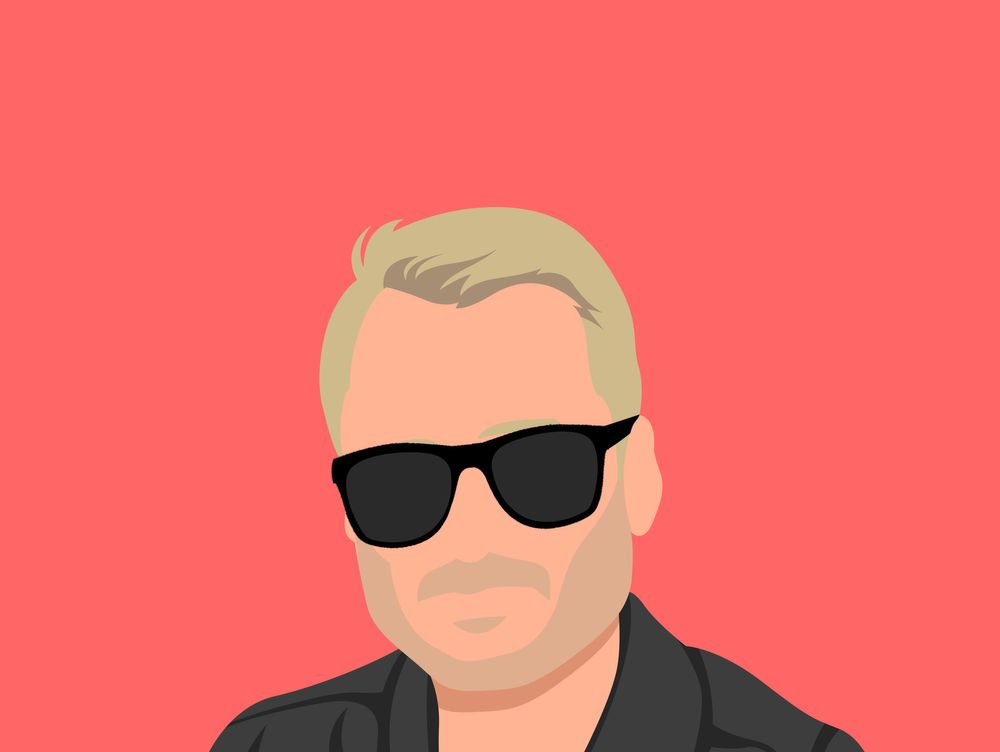
Courtesy of Chloé Valdary.
Chloe Valdary is an entrepreneur, writer, thinker and creator of Theory of Enchantment. Check out her TED Talk here and find her on Instagram here.
Listen to the episode on your favorite podcast site:
Apple Podcast: https://apple.co/3qbuEtJ
Spotify: https://spoti.fi/3HPBw62
Amazon Music: https://amzn.to/3s79IoZ
iHeartRadio:https://ihr.fm/3J3W2kT
ASHLEY: Let's start with a bit about you, who you are, where you came from...
CHLOE: I’m Chloé, I’m from New Orleans, originally, moved to New York five years ago. My New Orleans origin story is probably relevant to how I became a creative being. I grew up in a very eclectic, some would say, home, infused very much with the spirit of inquiry and orthodoxy simultaneously. I grew up in a Christian home that took Christianity very seriously, but a very non-mainstream form of Christianity, it's very similar to Seventh-day Adventist. We went to church on Saturdays instead of Sunday. We observed Rosh Hashanah and Yom Kippur, instead of Christmas and Easter.
ASHLEY: That's fascinating.
CHLOE: Yes, some would say nerdy but fascinating is a better world. It was a very good education that I received and as a result I had a very expansive, ironically, world view. I say ironic because there was an orthodoxy to it. It was very strict about following to a T the interpretation of Christianity that my parents had, but simultaneously that strict interpretation entailed studying the origin of things. At a very young age I was aware of the fact that my presence in New Orleans was not the only thing that existed. That are things that came before, and there will be things that come after.
ASHLEY: That's very rare.
CHLOE: I'm definitely learning that, in retrospect, the benefits of that education experience. As a result of that insider outsider experience that I had with identity, because I identified with Christianity but did not belong to mainstream Christianity, and simultaneously because of the way we did rituals I had an insider outsider relationship with the Jewish community as well, which created an awareness of paradox.
ASHLEY: In almost a very Jewish sounding way. I think about growing up in not particularly Jewish places, you feel that difference. It definitely gives you, I think, something observative. I think it puts people in a place where they're almost forced to observe.
CHLOE: You definitely add a distance. Sort of forced you to be an individual and to be your own person, I think. So, that influenced me a lot and then I became really heavily involved later on, in college, in the pro-Israel space as a result of that original affinity I had with Jewish culture. Which was initially cultivated by my religious upbringing. By the time I got to college I switched majors from Film to International Studies because I wanted to focus more on Israel peace. I did Israel advocacy for three and a half years. Afterwards I moved to New York, got a job with The WallStreet Journal, worked on a thesis at the journal. First it was initially about how to persuade people to love Israelis.
ASHLEY: That's a though mission.
CHLOE: That was the initial question but then it became : how do I get people to love in general ? Because love is a practice and requires a deliberate dedication and that became the Theory of enchantment so, there is an order of operations there for my origin story.
ASHLEY: So, how did you get to whatever the Theory of Enchantment is, and what is it ? What's the core of it?
CHLOE: I was doing this thesis paper, asking how do you get people to learn how to love, and then I thought, well maybe you have to figure out what are people already in love with? And maybe use to build a framework to teach them how to love. And what people already in love with ? Pop culture ! There are all these things in pop culture that people seem to gravitate towards in mass. What if I tried to figure out if there's a common denominator in influencers and companies, for example Nike, Beyoncé and Disney Films ? So I did and I figured out that the common denominator was that they all created content where the audience saw themselves and their potential reflected in the content very much.
ASHLEY: How did you get to that first question and answer of, a how to get them to love, which I guess is a bit more natural but then it doesn't seem so intuitive to jump from that to say what do they already love ? It feels it was a creative step. Something that probably took some thinking or doing.
CHLOE: I think I was already into comparative literature, and probably in the back of my head already into the study of pop culture. I remember studying the lyrics of a song by Drake and Rihanna and noticing there is something related to human psychology in the lyrics. And I remember English classes having a huge impression upon me and being more Philosophy classes where you would study these texts by all these brilliant people but it wouldn't just be about the content but how do you apply the content to your life.
ASHLEY: Do you think that's also connected to your upbringing in the sense of that kind of deep interaction with text as modeling ?
CHLOE: That's a very good question. I love my upbringing from an intellectual perspective because it was very unique, it was a very intellectual tradition to actually think about where things come from and the symbolism behind it.
ASHLEY: Right, I think that's also a misconception about religion is that it's non-questioning. Skepticism and doubt are not part of it whereas really at the core is you mostly confronting doubt.
CHLOE: I always joke that my parents realize the extent to which they opened up Pandora's box by giving me this tradition, because it is and was a questioning tradition but what that inevitably meant was I would have the license to question as well. I had that orthodoxy but I also had that inquisitiveness which I guess led to some of the things I'm doing right now.
ASHLEY: Going back to these sorts of icons of pop culture, how do you harness your fundamental tenet that we love these symbols because they show us the ability to achieve our potential ?
CHLOE: Initially it was the discovery of that. I was reading a lot of research books about pop culture at the time. I was reading a book called Enchantment by Guy Kawasaki, the former marketing director of Apple, who defined Enchantment as the process to which you delight someone. But also the concept of enchantment was already embedded in the Disney pantheon. So I just decided to call this process Enchantment because it's almost an awakening to the fact of your own existence and the fact of your own potential and consequently the fact of the potential of others around you. So then I took that and basically created a three principle framework on how to engender and cultivate enchantment in your interactions with people. . I was lecturing on mini college campuses about the Israeli-Palestinian conflict and they often times erupted, especially in college, into shouting matches. And I'm obsessed with this idea that you can hack into human psychology. So I was like can you design a framework where people are less likely to erupt into shouting matches and more likely to give people the benefit of the doubt and more likely to be generous with their assumptions and to greet each other with unconditional positive regard. So the three principles that I designed around this Theory of Enchantment were designed to try and do that. And the three principles are:
- Treat people like human beings, not political abstractions.
- Criticize to uplift and to empower, never to tear down, never to destroy.
- Root everything you do in love and compassion.
I lectured on that for two years on college campuses, people started to respond really positively and they were like this doesn't just apply to International Studies, it applies to so many different things like why don't you consider going out on your own and really going hard with the Theory of Enchantment? And enough people told me that and I was like, ok.
ASHLEY: Who were those people? Friends, colleagues?
CHLOE: These were people at my talks, at the lectures, some of my colleagues. Eventually I decided to go out on my own, start a LLC, Theory of Enchantment, and then I turned it into a full course. When I was on my own that's when I turned it into a full twenty-five lessons course. Like, ok we're going to break down these three principles. . We're gonna use pop culture and other rich sources to talk about what that means, talk about the human condition, talk about the things that every human being has to go through. Regardless of skin color or social-economic status or other immutable characteristics. We're going to talk about vulnerability, about mortality. We're going to talk about imperfection, how do we actually become content enough with ourselves given that we all have to deal with this, because what I kept noticing in terms of the pattern that produces not love but I would say extremism was a very repeatable pattern, it was insecurity combined with self-contempt combined with over-compensation for that, for those two things that led to extremism. So, to look backwards what we need here is a practice that teaches people to actually love themselves so that these other things don't manifest themselves later on in very negative ways.
ASHLEY: The product is necessarily extremism or when there is extremism those two factors are involved ?
CHLOE: The main important factor that synthesizes or catalyzes those two factors into extremism is overcompensation. Let's take a very easy example, about gang life. If you are living in a home where, let's say, your father walked off on the family so now you're dealing with issues of fatherlessness. The insecurity piece is the father leaving and the self-contempt piece is where the mind begins to think I'm not good enough, I'm not worthy enough, I'm not blank enough. And the overcompensation is when a person gravitates toward a place or a group that is going to give them a sense of belonging, a sense of meaning and for many that's the gang life.
ASHLEY: And power, I imagine, that's part of it.
CHLOE: I think that it is power in the sense that it fills the void, it gives you a sense of security. It's false security but it does give you that sense of security. And you know gang mentality is on the spectrum of extremism but a lot of studies show that people who gravitate towards gang life and the people who gravitate towards, let's say, white nationalist movements are dealing fundamentally with the same psychological issues. I feel we have to say Theory of Enchantment is like ok how do we try to thwart this process, you know, and build a sense of inner contentment, security in human beings so that they don't feel the need to gravitate toward these other organizations and things like that.
ASHLEY: The pop culture thing is really cool because it's exactly what you intended. Which is that you're kinda using the gravitational pole, the acttractiveness of pop culture, that energy that we love, to get people to tap into something else inside themselves. The question I have about is, especially for someone with a religious background or upbringing, how do you square it with the materialism of pop culture?
CHLOE: It's possible that you and I define pop culture differently. Because I consider The Book of Ecclesiastes, Kohelet, to be a part of pop culture, it is popular and it is a part of our culture so I mean pop culture in a very basic sense, not in a necessarily consumerist sense. So, there's the Lion King in the Theory of Enchantment but there's also stoicism in the Theory of Enchantment, and in fact I argue quite persuasively I think that the Lion King is super popular because it contains stoic teachings. And my theory is that if we argue that there are certain ideas that are timeless then we should expect to find them in contemporary form. What I'm doing is that I'm pulling back the layers and saying actually there's something far more deep about our gravitational pull towards this and it's not merely vain, and those things that we do gravitate towards because of vanity or because of selfish reasons are not going to withstand the test of time.
ASHLEY: It's a great point. It makes me think about Nike, because as simple and almost similarly simplistic as the slogan is, "Just do it", the more you think about it the more you're like that is absolutely brilliant. Before that existed no one was "just do it" as an inspirational thing, but the moment he grabbed that idea...
CHLOE: I think that's the moment Nike became in the eyes of many, quite frankly, a religion. And there's a reason why you have these people that call themselves shoeheads and want to collect as many new releases of Nike as possible, and it's not strictly materialistic, it's like a talisman, it's like a very religious thing, or is very much drawing from the religious impulse in human beings.
ASHLEY: That's a great point. Where do you go from here with the Theory of Enchantment, what's the vision and where you now in pursuing it ?
CHLOE: That's a good question, Theory of Enchantment is a full course, full training we sell to three different cohorts, we sell to individuals. We sell to high schools as well, social-motion learning program for teenagers and we sell to companies, professional development training offering an approach to diversity and inclusion that's rooted in development and psychology. That's in rooted psychological understanding of where racism comes from, and also that's much more holistic than a lot of the offerings that exist right now. So, right now I'm just trying to build, scale, really focusing primarily in those three categories so that our cohorts can buy it, but I'm really focusing right now on getting individuals and the companies sales up because the high school, the school market sort of speak is so fractured in America, it's even more fractioned now because of the pandemic so it's just a challenge to be able to deliver that in a scalable way but, right now I'm focusing primarily on individuals and companies. It's a long-term, ongoing sort of educational experience, for companies at least, it's not your typical, accommodating, do-it-in-two-days workshop. What comes with this in terms of twenty-five lessons course is that you should deploy to you teams to give them the necessary skills to not only make the culture better but to have a better relationship with themselves, and show up as, I think, self-starters more and wanting to make the company greater.
ASHLEY: And what is life like for you in New York city ?
CHLOE: Well, I mean, you know when you watch those shows about startups or those origin stories about Steve Jobs or stuff like that ? I feel like I'm now entering into that phase. And my life, like I have a whiteboard in my room now... it's like really okay to start at life with all the trappings that that comes with. So, I don't know if that sounds romantic or not but...
ASHLEY: It's probably best that it is.
CHLOE: Definitely, it's a good thing that I enjoy what I do. But, I'm really just focused on trying to build the Theory of Enchantment, so that's what life is like right now in New York. I mean, obviously, going to Manhattan and Manhattan is a little bit, kind of a ghost town. I've been reading all these pieces in the Time about how these business are shuttering and it's really depressing. Property values are going down, people are moving to the suburbs... I know New York will come back, but the question is what's the timeline? I actually have no idea given the cascading affecting all these life branding businesses closing, as well as Mom-and-Pop stores, so I don't know we'll see what happens in New York but I'm definitely planning on staying for a very long time and building the Theory of Enchantment now.
ASHLEY: Is there anything else you want to share? I saw you have a podcast…
CHLOE: We can also talk about music because I also make music production. My friend Jamie and I just came out with a new podcast today called So Much Things To Say, yes it’s grammatically incorrect, she actually named it after a Bob Marley’s song. It’s basically a podcast where we talk about everything going on in the world and in particular in America, but we also have a very artistic approach to how we talk about everything. Art and spirituality are massive components to the podcast. So, check it out!
ASHLEY: And music?
CHLOE: I’ve started producing music last year, really love it.
ASHLEY: Meaning what?
CHLOE: Meaning, last year I produced a total of maybe 12 songs, put them on SoundCloud, and then this year, I put seven or eight at the best into one album and published it on Spotify, so if you go to Spotify you can find my music under my name Chloé Valdary.
ASHLEY: When you say producing you don’t mean for a third-party?
CHLOE: No, it’s self-producing.
ASHLEY: How do you place that type of music, your sound? How did you get to this?
CHLOE: It started two and a half years ago. I was watching Netflix and I thought I need to learn guitar, why am I spending my summer watching Netflix instead of learning the guitar? So, I’ve decided to buy my best friends guitar because she wasn’t using and I learned basic guitar, that’s where it started. And then I just had fun with that, producing songs on GarageBand initially. Later on I graduated to Logic which is a more expensive GarageBand. I’m really proud of what I’ve produced so far, I have this secret fantasy of one day perform concerts. Put it out in the universe. I really want to do that once Covid is over.
ASHLEY: Once you’ve started, come perform in Israel.
CHLOE: Can you imagine? When I perform in Israel, it’s gonna be insane.
ASHLEY: Thank you so much. This is great. It was really nice to finally meet you after all these years of reading you.
CHLOE: Likewise Ashley, I appreciate it.





Join the conversation.